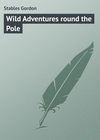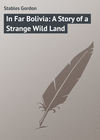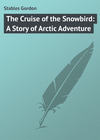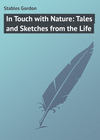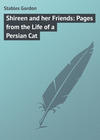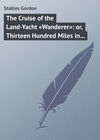Kitabı oku: «Wild Adventures round the Pole», sayfa 13
“‘I’ve won the breeks! I’ve won the canvas breeks, boys!’
“He had won them, and that right nobly, too. Well, after he had worn them for over a month, it became painfully evident even to Sandy that they sorely needed washing; but, woe is me! Sandy was too lazy to put a hand to them. But he thought of a plan, nevertheless, to save trouble. He steeped them in a soda ley, attached a strong line to them, and pitched them overboard to tow.
“When, after two hours’ towing, Sandy went to haul them up, great was his astonishment to find a great hammer-head spring half out of the water and seize them. Sandy had never seen so awful a monster before; he put it down as an evil spirit.
“‘Let go,’ he roared; ‘let go my breeks, ye beast.’
“Now, maybe, with those hooked teeth of his, the shark could not let go; anyhow, he did not.
“‘I dinna ken who ye are, or what ye are,’ cried Sandy, ‘but ye’ll no get my breeks. Ah! bide a wee.’
“Luckily the dolphin-striker lay handy, Sandy made a grab at it, and next minute it was hard and fast in the hammer-head’s neck. To see how that monster wriggled and fought, more like a fiend than a fish, when we got him on deck, would have – but look – look – r – ”
Seth had not been idle while his companions were talking. He had cut off choice pieces of blubber and thrown them into the sea; he had coiled his rope on the ice close by; then, harpoon in hand, he knelt ready to strike. Nor had he long to wait. The bait took, the bait was taken, the harpoon had left the trapper’s hand and gone deep into the monster’s body.
I will not attempt to describe the scene that followed – it was a death-scene that no pen could do justice to – the wild struggle of the giant shark in the water, his mad and frantic motions ere clubbed to death on the ice, and his terrible appearance as he snapped his dreadful jaws at everything within reach; but here is a fact, strange and weird though it may read – fully half an hour after the creature seemed dead, and lying on its side, while our heroes stood silently round it, with the wild birds wheeling and screaming closely overhead, the zugaena suddenly threw itself on its stomach as if about to swim away. It was the last of its movements, and a mere spasmodic and painless one, though very distressing to witness.
Chapter Twenty Three.
Rory’s Reverie – Silas on the Scymnus Borealis – The Battle with the Sharks – Rory Gets in for it again – Thrown among the Sharks
The ships still lay hard and fast in the ice-pack, many miles to the nor’ard and eastward of the Isle of Jan Mayen. There was as yet no sign of the frost giving way. Day after day the bay ice between the bergs got thicker and thicker, and the thermometer still stood steadily well down below zero. But the wind never blew, and there never was a speck of cloud in the brilliant sapphire sky, nor even haze itself to shear the sun of his beams; so the cold was hardly felt, and after a brisk walk or scamper over the ice our heroes felt so warm that they were in the habit of throwing themselves down on the snow on the southern side of a hummock of ice. Book in hand, Rory would sometimes lie thus for fully half an hour on a stretch. Not always reading, though; the fact of Rory’s having a book in his hand was no proof that he was reading, for just as often he was dreaming; and I’ll tell you a little secret – there were a pair of beautiful eyes which were filled with tears when last he had seen them, there were two rosy lips that had quivered as they parted to breathe the word “good-bye.” These, and a soft, small hand that had lain for a moment in his, haunted him by night and by day, and seemed ever present with him through all his wild adventures.
Ah! but they didn’t make him unhappy, though; no, but quite the reverse.
He was reclining thus one day all by himself, about a quarter of a mile from his ship, when Ralph and McBain came gently up behind him, walking as silently as the crisp snow, that felt like powdered glass under their feet, would permit them.
“Hullo! Rory,” cried McBain, in a voice of thunder.
Startled from his reverie, Rory sprang to his feet, and instinctively grasped his rifle.
His friends laughed at him.
“It is somewhat late to seize your rifle now, my boy,” said McBain; “supposing now we’d been a bear, why, we would be eating you at this present moment.”
“Or making a mouse of you,” added Ralph, “as the yellow bear did of poor Freezing Powders; and at this very minute you’d be —
“‘Dancin’ for de dear life
Among de Greenland snow.’”
“I was reading,” said Rory, smiling, “that beautiful poem of Wordsworth, We are seven.”
“Wordsworth’s We are seven?” cried Ralph, laughing. “Oh! Row, Row, you’ll be the death of me some day. Since when did you learn to read with your book upside down?”
“Had I now?” said Rory, with an amused look of candour. “In troth I daresay you are right.”
“But come on, Row, boy,” continued Ralph, “luncheon is all ready, Peter is waiting, and after lunch Silas Grig is going to show as some fun.”
“What more malley-shooting?” asked Rory.
“No, Row, boy,” was the reply; “he is going to lead us forth to battle against the sharks.”
“Against the sharks!” exclaimed Rory, incredulous.
“I’m not in fun, really,” replied Ralph. “Silas tells us they are in shoals of thousands at present under us; that the sea swarms with them, some fifteen feet long, others nearer twenty.”
“Oh!” said Row; “this is interesting. Come on; I’m ready.”
While the trio stroll leisurely shipwards over the snow, let me try to explain to my reader what Rory meant by malley-shooting, as taught them by Silas Grig. The term, or name, “malley,” is that which is given by Greenlandmen to the Arctic gull. Although not so charming in plumage as the snowbird, it is nevertheless a very handsome bird, and has many queer ways of its own which are interesting to the naturalist, and which you do not find described in books. These gulls build their nests early in the season on the cliffs of Faroe and Shetland, and probably, though I have never found them, in sheltered caves of Jan Mayen and Western Greenland as well. Despite the extreme cold, they manage to bring forth and rear their young successfully, and are always ready to follow Greenland ships in immense flocks. Wherever work is going on, wherever the crack of the rifle is heard on the pack, wherever the snow is stained crimson and yellow with blood, the malleys will be there in daring thousands. The most curious part of the thing is this: they possess a power of either scent or sight, which enables them to discover their quarry, although scores of miles away from it. For example – the Arctic gulls, as a rule, do not follow a ship for sake of the bits of bread and fat that may be thrown overboard. Some of them do, I know, but I look upon these as merely the lazaroni, the beggars of their tribe; your healthy, youthful, aristocratic malley prefers something he considers better. Give him blubber to eat, or the flesh of a new slain seal, and he will follow you far enough. Now a ship may be lying becalmed off this pack, with no seals in sight, and doing nothing; if so she will be deserted by these birds. Not from the crow’s-nest, though aided by the most powerful telescope, will you be able to descry a single gull; but no sooner is a sealskin or two hauled on deck to be cleared of their fat, than notice seems to be flashed to the far-off gulls, and in a few minutes they are winging around you, making the welkin ring with their wild, delighted screams. They alight in the water around a morsel of meat in such bunches, that a table-cloth would cover two dozen of them.
Having had enough – and that “enough” means something enormous – they go off for a “fly,” just as tumbling pigeons do. You may see them in hundreds high in air, sailing round and round, enjoying themselves apparently to the very utmost, and shrieking with joy. Now is the time for the skua to attack them. A bold, black, hawklike rascal is this skua, a robber and a thief. He never comes within gunshot of a ship. He is as wild and untamable as the north wind itself; yet, no sooner have the malleys commenced their post-prandial gambols than he is in the midst of them. He does not want to kill them; only some one or more must disgorge their food. On this the skua lives. No wonder that Greenland sailors call him the unclean bird.
The malley-gull floats on the waves as lightly and gently as a child’s toy air-ball would. His usual diet is fish, except in sealing times; and of the fish he catches the marauding skua never fails to get his share. It is for the sake of the feathers sailors shoot these birds on the ice, for they are nearly as well feathered as an eider duck.
Getting tired of shooting seals in the water, Rory and Allan one day, leaving the others on the banks of the great ice-hole, determined to make a bag of feathers. And here is how they bagged their game.
Armed with fowling-pieces, they retired to some distance from the water party and lay down behind a hummock of ice. Here they might have lain until this day without a bird looking twice in their direction had they not provided themselves with a lure. This lure was simply a pair of the wings of a gull, which one waved above his head, while the other prepared to fire right and left. And not a minute would these wings be waved aloft ere the gulls, with that strange curiosity inherent in all wild creatures, would begin to circle around, coming nearer and nearer, tack and half-tack, until they were within reach of the guns, when – down they came. But the untimely end of one brace nor twenty did not prevent their companions from trying to solve the mystery of the waving wings.
Luncheon was on the table, and our friends were seated around it, all looking happy and hungry. Rory would have liked to have asked Silas Grig right straight away about the expedition against the sharks but for one thing – he didn’t like to appear too inquisitive; and, for another, he was not quite sure even now that it was not one of Ralph’s pretty jokes. But when everybody had been served, when weather and future prospects, the state of the thermometer and height of the barometer, had been discussed, Rory found he could not contain himself any longer.
“What are you going to be doing after lunch?” he asked Silas, pointedly.
“Aha, boy Rory!” was the reply; “we’ll have such sport as you never saw the likes o’ before!”
Rory now began to see there really was no joke about the matter; and Ralph, who was sitting next to him, pinched him for his doubt and misbelief. The two young men could read each other’s thoughts like books.
“Do you mean to say you are going to catch sharks in earnest, you know?” asked Rory.
“Well,” said Silas, with a bit of a laugh, “I’m going to have as good a try at it as ever I had. And as for catching ’em in earnest, I’m thinking it won’t be fun – for the sharks!”
“It is the Scymnus borealis, isn’t it?” said Dr Sandy McFlail, “belongin’, if my memory serves me, to the natural family Squalidae– a powerful brute, and a vera dangerous, too.”
“You may call him the Aurora borealis if you like, doctor,” said Silas; “and as for his family connections I know nought, but I daresay he comes from a jolly bad stock.”
“Natural history books,” said Allan, “don’t speak of their being so very numerous.”
“Natural history books!” reiterated Silas, with some warmth of disdain. “What do they know? what can they teach a man? Write a complete history of all the creatures that move about on God’s fair earth, that fly in His air or swim in His sea, and you’d fill Saint Paul’s with books from top to bottom – from the mighty cellars beneath to the golden cross itself. No, take my advice, boy Rory; if you want to study nature, put little faith in books. The classification is handy, say you? Yes, doctor; and I’ve seen a stripling fresh from college look as proud as a two-year-old peacock because he could spin you off the Greek names of a few specimens in the British Museum, though he couldn’t have told you the ways and habits of any one of them to save him from having his leave stopped. There is only one way, gentlemen, to study natural history; you must go to the great book of Nature itself – ay, and be content, and thankful, too, if, during even a long lifetime, you are able to learn the contents of even a single page of it.”
Rory, and the doctor, too, looked at Silas with a kind of new-born admiration; there was more in this man, with his weather-beaten, flower-pot-coloured face, than they had had any idea of.
“If I had time, gentlemen,” Silas added, “I could tell you some queer stories about sharks. ‘I reckon,’ as poor old Cobb used to say, that some o’ them would raise your hair a bit, too!”
“And what kind of a monster is this Greenland shark?” asked Allan.
“No more a monster,” said Silas, “than I am. God made us both, and we have each some end to fulfil in life. But if you want me to tell you something about him, I’ll confess to you I love the animal about as much as I do an alligator. He comes prowling around the icebergs when we are sealing to see what he can pick up in the shape of a dead or wounded seal, a chunk o’ blubber, or a man’s leg. He is neither dainty nor particular, he has the appetite of a healthy ostrich, and about as much conscience as a coal-carter’s horse. He is as wary as a five-season fox, and when he pays your ship a visit when out at sea, he looks as humble and unsophisticated as a bull trout. He’ll take whatever you like to throw him, though – anything, in fact, from a cow’s-heel to the cabin boy – and he’ll swallow a red-hot brick rather than go away with an empty stomach. But when he comes around the ice at old-sealing time he doesn’t come alone, he brings his father and mother with him, and his uncles and aunts, and apparently all his natural family, as the doctor calls it. And fine fun they have, though they don’t agree particularly well even en famille. I’ve seen five of them on to one seal crang, and there was little interchange of courtesies, I can tell you. He’s not a brave fish, the Greenland shark, big and all as he is. If you fall into the water among a score of them your best plan is to keep cool and kick. Yes, gentlemen, by keeping cool and kicking plenty I’ve known more than one man escape without a bite. The getting out is the worst, though, for as long as you splash they keep at a distance and look on; they don’t quite know what to make of you; but as soon as you get a hold of the end of the rope, and are being drawn out, look sharp, that’s all, or it will be ‘Snap!’ and you will be minus one leg before you can wink, and thankful you may be it isn’t two. A mighty tough skin has the Greenland shark,” continued Silas; “I’ve played upon the back of one for over half an hour with a Colt’s revolver, and it just seemed to tickle him – nothing more. I don’t think sharks have much natural affection, and they are no respecters of persons. I do believe they would just as soon dine off little Freezing Powders here as they would off a leg of McBain.”
“Oh, oh, Massa Silas!” cried Freezing Powders, “don’t talk like dat; you makes my flesh all creep like nuffin’ at all!”
“They are slow in their movements, aren’t they?” said the doctor.
“Ay!” said Silas, “when they get everything their own way; but they are fierce, revengeful, and terrible in their wrath. An angry shark will bite a bit out of your boat, collar an oar, or do anything to spite you, though it generally ends in his having his own head split in the long run.”
(Silas Grig’s description of the Greenland shark is a pretty correct one, so far as my own experience goes. – G.S.)
“The men are all ready, sir,” said Stevenson, entering the cabin at that moment, “to go over the side, sir.”
“Thank you,” said the captain; “send them on to the ice, then, for a general skylark till we come up.”
When the officers did come up they found all the men on the ice, and a pretty row they were having. They were running, racing, jumping high leap and low leap, boxing, and fencing with single-sticks, quarter-staves, and foils; and last but not least, a party were dancing the wild and exciting reels of Scotland, with Peter playing to them just as loudly as he knew how to, although his eyes seemed starting from his head, and his face was as red as a dorking’s comb in laying season.
Then it was “Hurrah for the ice-hole!” and “Hurrah for the sharks!”
Silas did not take very long to get his party – his fishing-party, as he called it – into working order. He evidently meant business, and expected it, too. He had seven or eight long lines, to each of which was attached a piece of chain and an immense shark-hook. These were baited with pieces of blubber; the men were armed with long knives and clubs. So sure was Silas Grig of capturing a big haul of these sea-fiends, the Greenland sharks, that he had a large fire of wood lighted on the ice at some little distance, and over it, suspended by a kind of shears, hung an immense cauldron. In this it was intended to boil the livers of the sharks in order to extract the oil, which is the most valuable part of the animal.
Until tempted by huge pieces of seal-flesh hardly a shark showed fin; but when once their appetites were wetted then – !
I cannot, nor will I attempt to describe this battle with the sharks, although such a fight I have been eyewitness to. Sometimes as many as two were hauled out at once; it required the united strength of fifteen or twenty men to land them. Then came the struggle on the ice, the clubbing, the axing, and the death, during which many a man bit the snow, though none were grievously wounded. Before the sun pointed to midnight, between thirty and forty immense sharks had been captured, and the oil from their livers weighed nearly a ton.
Poor Rory – to whom all the best of the fun and all the worst misfortunes seemed always to fall – had a terrible adventure during the battle. Carried away by his enthusiasm, with club in hand, he was engaging one of the largest sharks landed. The brute bent himself suddenly, then as suddenly straightened himself out, and away went boy Rory, like an arrow from a cross-bow, alighting in the very centre of the pool. For a moment every one was struck dumb with horror!
But Rory himself never lost his presence of mind. He remembered what Silas had said about splashing and kicking to keep the sharks at bay. Splash? I should think he did splash, and kick, too; indeed, kicking is hardly any name for his antics. He made a wheel of himself in the water. He seemed all arms and legs, and as for his head, it was just as often up as down, and vice versâ; and all the while he was issuing orders to those on the bank – a word or two at a time, whenever his head happened to be uppermost, so that in the midst of the splashing and spluttering his speech ran like this:
“Stand by” – (splutter, splutter) – “you fellows” – (splash, splash) – “up there” – (splutter) “to pull quick” – (splash) – “as soon as!” – (splutter, splutter) – “catch the rope.” – (splash, splash) – “Now lads, now!” – (splutter, splutter, splash, splash, splutter, splutter, splash).
“Hurrah!” he cried, when he found himself on the ice. “Hurrah! boys. Cheer, boys, cheer. Safe to bank! Hurrah! and both my legs as sound as a bell, and never a toe missing from any single one of the two o’ them. Hurrah! Sure it’s myself’ll be Queen o’ the May to-morrow. Hurrah!”
Yes, reader, the very next day was May-day, and on that day there are such doings on Greenland ships as you never see in England.
Chapter Twenty Four.
May-Day in the Arctic Regions
May-day! May-day in England! Surely, even to the minds of the youngest among us, these words bring some pleasant recollections.
“Ah! but,” I think I hear you complain, “the May-days are not now what they were in the good old times; not the May-days we read of in books; not the May-days of merrie England. Where are the may-poles, with their circles of rosy-cheeked children dancing gleesomely around them? Where are the revels? Where are the games? Where is the little maiden persistent, who plagued her mother so lest she should forget to wake and call her early —
“‘Because I’m to be Queen o’ the May, mother,
I’m to be Queen o’ the May?’
“And echo answers, ‘Where?’”
These things, maiden included, have passed away; they have fled like the fairies before the shriek of engine and rattle of railway wheels.
But May-day in England! Why, there is some pleasure and some joy left in it even yet. Summer comes with it, or promises it will soon be on the wing. Already in the meadows the cattle wade knee-deep in dewy grass, and cull sweet cowslips and daisies. A balmier air breathes over the land; the rising sun is rosy with hope; the lark springs from his nest among the tender corn, and mounts higher to sing than he has ever done before; flowers are blooming on every brae; the mossy banks are redolent of wild thyme; roses begin to peep coyly out in the hedgerows, and butterflies spread their wings, as a sailor spreads a sail, and go fluttering away through the gladsome sunshine. And yonder – why, yonder is a little maiden, and a very pretty one, too, though she isn’t going to be Queen o’ the May. No, but she is tripping along towards the glade, where the pink-blossomed hawthorn grows, and the yellow scented furze. She is going to —
Bathe her sweet face in May-morn dew,
To make her look lovely all the year through.
She glances shyly around her, hoping that no one sees her. You and I, dear reader, are far too manly to stand and stare so.
Hey! presto! and the scene is changed.
May-day! May-day in Greenland! An illimitable ocean of ice, stretching away on all sides towards every point of the compass from where those ships are lying beset. It looks like some measureless wold covered with the snows of midwinter. It is early morning, though the sun shines brightly in a sky of cloudless blue, and, save for the footfall of the solitary watchman who paces the deck of the Arrandoon, there is not a sound to be heard, the stillness everywhere is as the stillness of death. An hour or two goes slowly by, then the watchman approaches the great bell that hangs amidships.
Dong-dong! dong-dong! dong-dong! dong-dong! Eight bells. The men spring up from hatch and companion-way, and soon the decks are crowded and the crew are busy enough. They have discussed their breakfast long ago, and have since been hard at work on the May-day garland, which they now proceed to hoist on high, ’twixt fore and main masts. That garland is quite a work of art, and a very gay one, too. Not a man in the ship that has not contributed a few ribbons to aid in decorating it. Those ribbons had been kept for this special purpose, and were the last loving gifts of sisters, wives, or sweethearts ere the vessel set sail for the sea of ice. But there is more to be done than hoisting the garland. The ship has to be dressed, and when this is finished, with her flags all floating around her, she will look as beautiful as a bride on her marriage morning.
None the worse for the ducking and fright of the previous day, Rory was first up on this particular May-day, and tubbed and dressed long before either Allan or Ralph was awake.
“Get up, Ray!” cried Rory, entering his friend’s cabin.
“Ray, Ray, Ray!”
The last “Ray” was shouted.
“Hullo! hullo!” cried Ray. “Oh! it’s you, is it, Row? Is breakfast all ready, old man?”
“Ray, arise, you lazy dog!” continued Row, shaking him by the shoulder. “This is May-morning, Ray, and I’m to be Queen of the May, my boy, I’m to be Queen of the May!”
At half-past eight our heroes, Captain McBain included, went on deck in a body, and this was the time for the crew to cluster up the rigging, man the yards, and give voice to a ringing cheer; nay, not one cheer only, but three times three; and hardly had the sound died away ere it was taken up and re-echoed back by the crew of the Canny Scotia. It seemed that Captain Cobb’s cockle-shell was not to be left out of the fun either, for the crew of even that tiny craft must man the rigging and cheer, though after the lusty roar that had gone up from the other ships, their voices sounded like that of a chicken learning to crow.
After this, while the men went to work to rig a great platform on the upper deck, Peter, arrayed in fullest Highland costume, played pibroch after pibroch, and wild march after wild march, as he went strutting up and down the quarter-deck.
The decks were cleared of everything that could be removed, and a great tent erected from mizen to foremast; when this was lined with flags there was but little light, but lamps in clusters were hung here and there, and a stove was brought up to give heat, so that the whole place was as gay as could be, and comfortable as well.
At one end of the tent a platform was erected. There the piano was placed all handy, and Rory’s fiddle and the doctor’s flute, as well as several armchairs and a kind of a throne, the use of which will soon be seen. On the stage at one side was an immense tub nearly filled with cold, icy water; two steps led up to it, and on the edge thereof was a revolving chair. Very comfortable it looked indeed, but, on touching a spring, backwards it went, and whoever might be sitting on it had the benefit of a beautiful bath. My readers already guess what this is for. Yes, for May-day in Greenland is not only a day of fun and frolic, but the self-same kind of performance takes place as on southern ships while crossing the line.
The day itself was dedicated to games on the ice, for not until towards evening would the real fun begin. The seals had a rest to-day, and so had the sharks; even the terrible zugaena wasn’t once thought of, and Bruin himself might sit on one end licking his chops and looking on, so long as he kept at a respectful distance. The games were both Scotch and English, a happy medley in which all hands joined. The morning saw cricket and football matches in full swing, the afternoon golf – and golf played on hummocky ice is golf – and hockey. Peter was the band, and right well he played; but when, tired of march quadrille, or pibroch, he burst into a Highland reel, and the crews began to dance – well, the scene on the snow grew exciting indeed. It was grotesque enough, too, in all conscience, for everybody, without exception, was dressed in fancy costume.
No wonder, too, that Cockie, whom his master had brought on deck to look down on them from the bulwarks, lost all control of himself, and shouted, “Go on – go on – keep it up – keep it up.” Then when Cockie began to throw his head back and shriek with laughter, the men couldn’t resist it any longer; they joined in that laugh, and laughed till sides ached and eyes ran water, and many had to roll in the snow to prevent catastrophes. But the louder the men laughed, all the louder laughed Cockie, till Freezing Powders was obliged to run below with him at last.
“Oh!” said his master, as he restored the cage to its corner, “I tell you all day, Cockie, you eat too much hemp. It’s drefful, Cockie, to hear you laugh like all dat.”
Suddenly from the bows of the Arrandoon a big gun is fired, and the revel stops. Then comes a hail from the crow’s-nest, —
“Below there?”
“Ay, ay!” roared McBain.
“A procession coming along over the snow, sir, towards the ship.”
A consultation was at once held, and it was resolved to march forth to meet them.
“It is Neptune, I know,” said McBain, “for a snowbird this morning brought me a note to say he’d dine with us.”
It wasn’t long before our friends came in sight of the royal party. It was Neptune, sure enough, trident and all, both his trident and he looking as large as life. – He was drawn along in a sledge by a party of naiads, and Amazon jades they looked. On one side of him walked his wife, on the other the Cock o’ the North, while behind him came the barber carrying an immense razor and a bucket of lather. Silas Grig, I may as well mention, played Neptune, and Seth his wife – and a taller, skinnier, bristlier old lady you couldn’t have imagined; and her attempts to act the lady of fashion, and her airs and graces, were really funny. The Cock o’ the North was Ted Wilson. He was dressed in feathers from top to toe, with an immense bill, comb, and wattles, and acted his part well. He was introduced by Neptune as —
“One who ne’er has been to school,
But keeps us fat – in fact, our fool;
A fool, forsooth, yet full of wit
As he can stand, or lie, or sit.”
After the usual introduction, salaams, and courtesies, Neptune made his speech in doggerel verse, with many an interruption both from his wife and his fool, telling how “his name was Neptune” – “though it might be Norval,” added the Cock o’ the North. How —
“From east to west, from pole to pole,
Where’er waves break or waters roll,
My empire is – ”
His Wife– “And you belong to me.”
Cock o’ the North. – “All hail, great monarch of the sea!”
Neptune– “The clouds pay tribute, and streams and rills
Come singing from the distant hills.”
His Wife. – “Do stop, my dear; you’re not a poet,
And never were – ”
Neptune. – “Good sooth, I know it.
But now lead on, our blood feels cold,
For truth to tell, we’re getting old.
We and our wife have seen much service,
Besides – the dear old thing is nervous,
So to the ship lead on, I say,
We’d see some fun on this auspicious day.
My younger sons I fain would bless ’em.”
His Barber. – “And I can shave.”
His Wife (rapturously). – “And I can kiss ’em.”
The six poor lads who were to be operated on, and whose only fault was that they had never before crossed the line, trembled in their prison as they heard the big guns thunder forth, announcing the arrival of King Neptune. They trembled more when, dressed in white, they were led forth, a pair at a time, and seated blindfolded on the chair of the terrible tub, and duly shaved and blessed and kissed; but they trembled most when the bolt was drawn, and they tumbled head foremost into the icy water; but when, about twenty minutes thereafter, they were seen seated in a row in dry, warm clothing, you would not have known them for the same boys. Their faces were beaming with smiles, and each one busied himself discussing a huge basin of savoury sea-pie. They were not trembling then at all.
